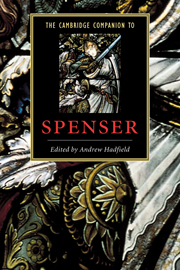Book contents
- Frontmatter
- Introduction
- 1 Spenser's life and career
- 2 Historical contexts: Britain and Europe
- 3 Ireland: policy, poetics and parody
- 4 Spenser's pastorals: The Shepheardes Calender and Colin Clouts Come Home Againe
- 5 The Faerie Queene, Books I-III
- 6 The Faerie Queene, Books IV-VII
- 7 Spenser's shorter poems
- 8 Spenser's languages: writing in the ruins of English
- 9 Sexual politics
- 10 Spenser's religion
- 11 Spenser and classical traditions
- 12 Spenser and contemporary vernacular poetry
- 13 Spenser's influence
- Index
11 - Spenser and classical traditions
Published online by Cambridge University Press: 28 May 2006
- Frontmatter
- Introduction
- 1 Spenser's life and career
- 2 Historical contexts: Britain and Europe
- 3 Ireland: policy, poetics and parody
- 4 Spenser's pastorals: The Shepheardes Calender and Colin Clouts Come Home Againe
- 5 The Faerie Queene, Books I-III
- 6 The Faerie Queene, Books IV-VII
- 7 Spenser's shorter poems
- 8 Spenser's languages: writing in the ruins of English
- 9 Sexual politics
- 10 Spenser's religion
- 11 Spenser and classical traditions
- 12 Spenser and contemporary vernacular poetry
- 13 Spenser's influence
- Index
Summary
'Classical traditions' is a less than appealing title. In fact, the phrase conjures up a whole gallery of misery: an unhealthy subservience to Virgil, Ovid, Homer and the rest, an unquestioning regard for the authority of antiquity, a failure to value individual creativity, and a lack of responsiveness to the immediate pressures of the present. What could be worse?
Spenser's response to classical traditions is usually exempted from these strictures. His eighteenth-century admirers often characterise his response to his reading as dreamily eclectic, in a manner which enabled him to make something entirely his own out of his classical reading. He is also often said to have lacked a very precise understanding of the classics. Thomas Greene, for example, suggests that Spenser lacks the awareness of anachronism - that is, a sense of how his culture differs from that of ancient Rome - which was the central emerging element in the ways Renaissance poets responded to their classical predecessors. In The Faerie Queene, Greene claims, 'historical self-consciousness seems sporadic and dim'. The chief aim of this chapter is to destroy once and for all this vision of Spenser as a happy anachronist, and to show how Spenser responded in highly sophisticated ways both to the complexities of his classical originals and to the uncertainties of his time. From the interplay of these two forces Spenser generates some of his most subtle and topical writing.
- Type
- Chapter
- Information
- The Cambridge Companion to Spenser , pp. 217 - 236Publisher: Cambridge University PressPrint publication year: 2001
- 2
- Cited by



